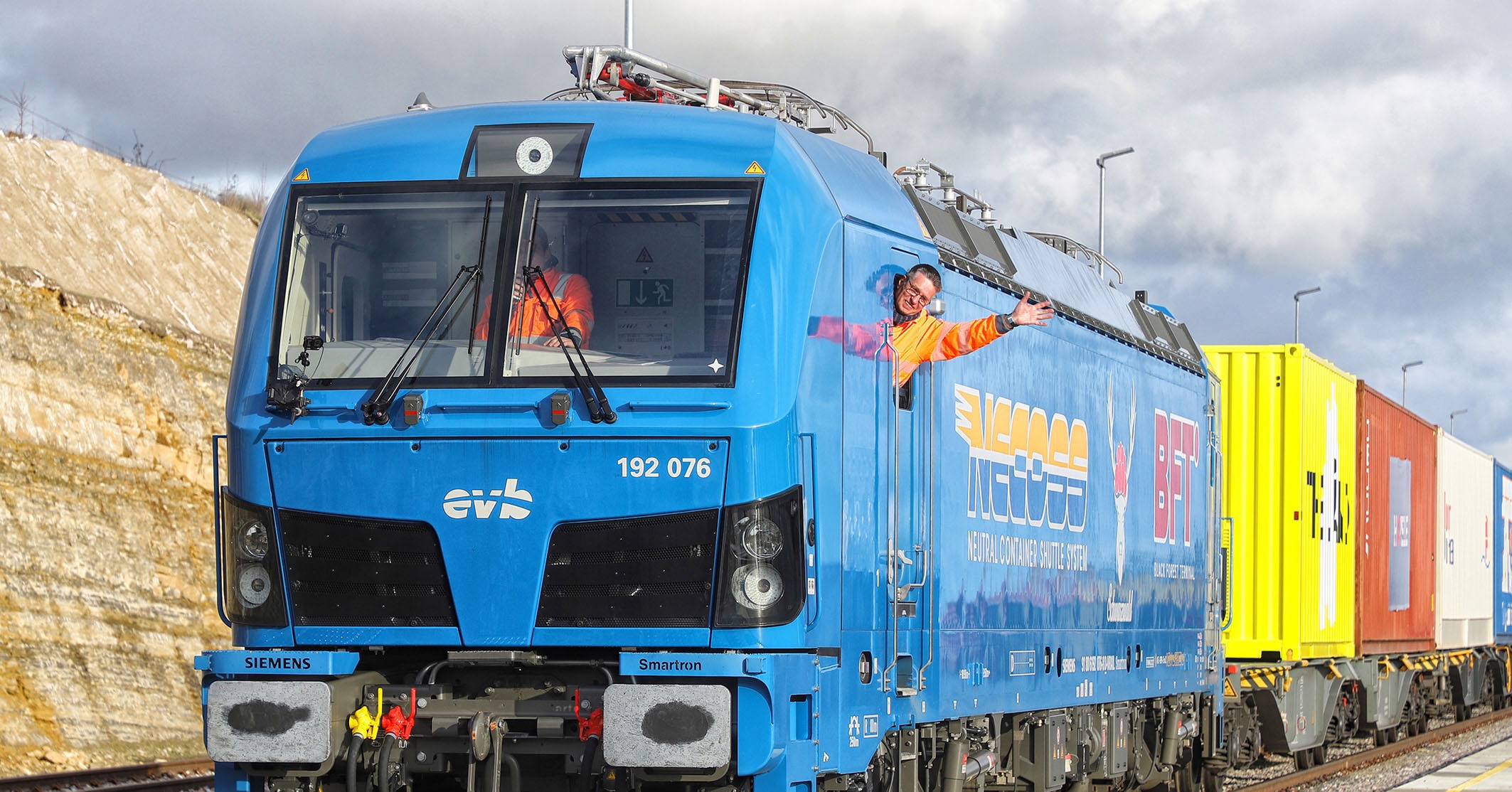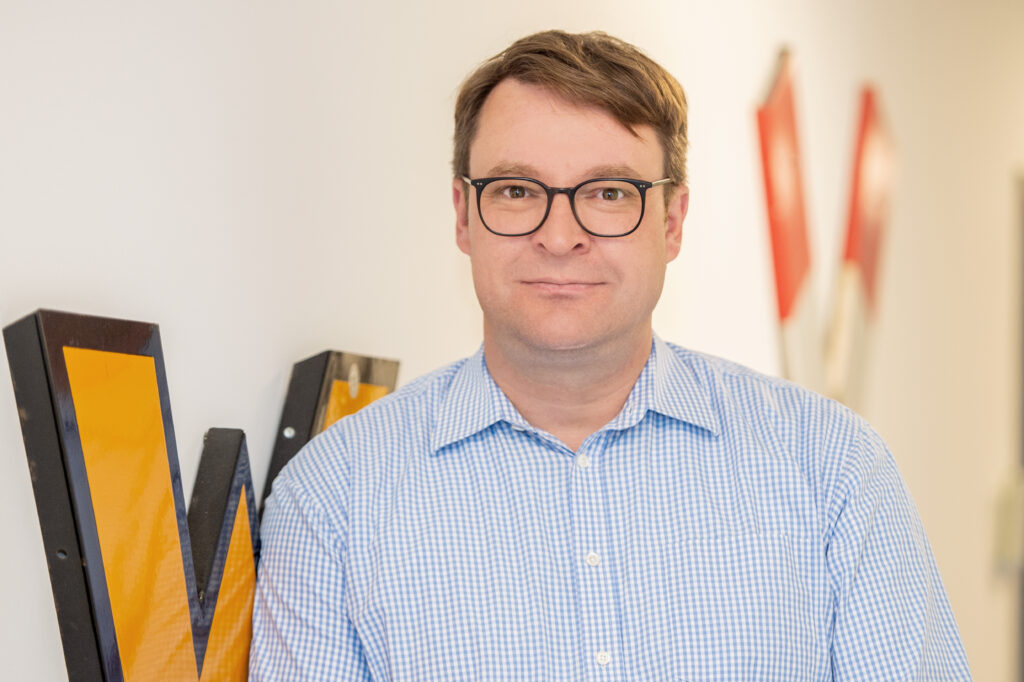Modility ist von der Bundesvereinigung Logistik (BVL) als Finalist beim Deutschen Logistik-Preis 2023 ausgezeichnet worden! 🎉 –> Learn more
Modility ist von der Bundesvereinigung Logistik (BVL) als Finalist beim Deutschen Logistik-Preis 2023 ausgezeichnet worden! 🎉 –> Learn more

On January 10, 2023, the Black Forest Terminal (BFT) in Horb (Neckar), a new hub for Combined Transport, went into operation. Baden-Württemberg's Transport Minister Winfried Hermann described the terminal as a "valuable investment in a green future". Since its launch, the transport company Necoss offers two fixed train rounds per week between Horb and the Port of Hamburg, saving up to 200 truck journeys per week and enabling an additional 18,000 containers to be transported by rail each year. In an interview, Necoss Managing Director Sebastian Doderer discussed with us the importance of the new terminal, the new Necoss relationship with modility and rail as an efficient transport alternative.
Sebastian Doderer: The terminal offers a completely new possibility for the transport of containers to Baden-Württemberg. Necoss has been operating between the German seaports and Baden-Württemberg since it was founded 20 years ago, so we know the bottlenecks and problems there very well. Many projects have been launched to increase capacity, but it was rare that anything was implemented in the end. The Black Forest Terminal in Horb, on the other hand, could be realized very quickly thanks to the cooperation of politics, local business and the transport industry. There were only 6 months between the planning approval decision and completion - that is very rare in Germany and a real stroke of luck.
Sebastian Doderer: The new terminal in Horb is based on an initiative of the local economy, i.e. shippers from the northern Black Forest region as well as the transport industry in the form of road carriers, some of whom also offer intermodal services. Through our company history, we have been connected to many of these companies for decades and are in close exchange. Because it was clear from the very beginning that no centrally planned giant terminal was to be realized here, but rather a regionally structure-promoting project, we have intensively supported the ideas since the planning and preparation phase. We are now the first operator to approach the Black Forest Terminal. But everyone knows that a terminal like this is basically open to various operators and that it will also be used by many other train providers in the future.

Sebastian Doderer: The connection from Hamburg to Horb is a very good addition for the strong economic area south of Stuttgart to the Swiss border. Baden-Württemberg is known as the land of hidden champions. There are many medium-sized enterprises and export businesses within the area. At the same time, it is a very prosperous region, so there is also a lot going on in terms of imports. After the direct connection from Hamburg to Singen was discontinued, there was really nothing left south of Stuttgart in terms of CT connections. The new line now again offers a possibility for freight traffic on the north-south axis as far as the Black Forest.
Horb is also particularly interesting because the additional 60 kilometers of rail transport from Stuttgart mean that the cargo does not have to be transported by truck through the congestion-prone Stuttgart metropolitan area when reaching destinations such as the Black Forest, the Swabian Alb or Lake Constance. In the end, of course, this also has a positive effect on the eco-balance.
Sebastian Doderer: We currently run twice a week. That's what's possible with one locomotive and one set of wagons. This is because Horb is not located directly on the main line, which means there will be a few extra expenses for rail operations. However, it is already certain that the access line to the terminal will be extended next year, so we want to increase to three rotations by then at the latest. A new project like this has to get off the ground first.
Sebastian Doderer: Like our other trains, our transport offer is aimed at large shippers, shipping companies and forwarders, who can book container transport with us. We offer this both in pure rail transport and in Combined Transport. This means that we have local partners with whom we offer the complete transport from the port terminal in Hamburg to the loading ramp in all communities in Baden-Württemberg.
Sebastian Doderer: Because you help protect the environment on one hand and save costs on the other.
Sebastian Doderer: Especially for new projects like this, where we also want to address new customers, a central marketing platform like modility is very helpful. Due to its high reach, the portal is an ideal addition for us as a marketing opportunity and sales channel, and we hope to be able to draw even more attention to this new offering. The more people hear about it, the better.
Sebastian Doderer: We are basically always working on new relations. For many things, it is still too early to say anything specific. However, it is already certain that we are working with our partners in Baden-Württemberg on a connection between the Horb terminal and the Adria. This is another sensible addition, because on the one hand there is a lot of traffic to the Middle East in this region, and on the other hand thousands of nautical miles of shipping can be saved for traffic to Baden-Württemberg, generating enormous savings in time and CO2 emissions.
Sebastian Doderer: Because it is the most efficient domestic transport option. Last year, rail proved that even under very difficult conditions, it is capable of moving volumes that would not be possible with other modes of transport in Germany. Particularly when we look at the seaports in Hamburg and Bremerhaven, we are talking about orders of magnitude of several million TEU per year running by rail, which would otherwise not be manageable at all.
The development of ship sizes has also meant that the volume of hinterland traffic is no longer stable throughout the week but is subject to very strong peaks during the few calls of large ships. In some cases, several tens of thousands of containers must be unloaded within 36 hours. Only rail can provide this transport capacity.

Language